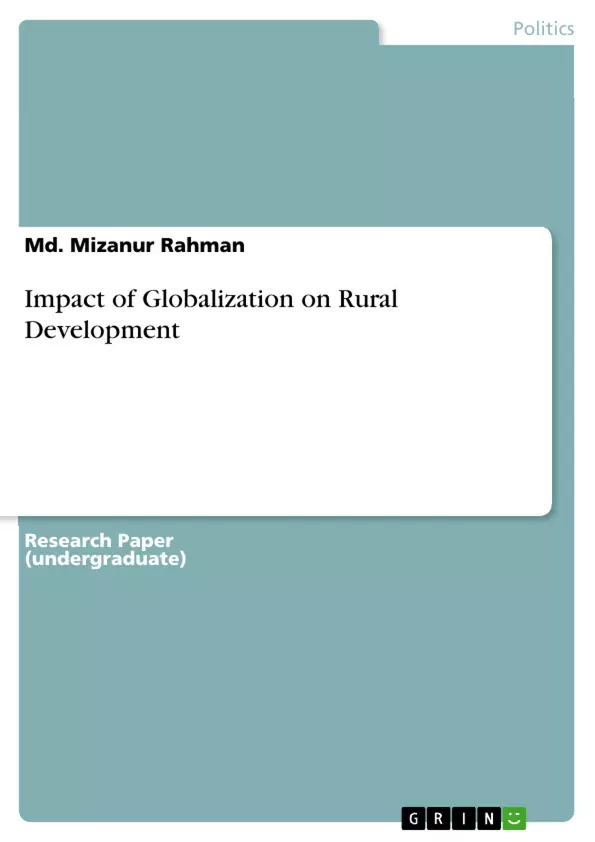In a globalized world the dynamics of rural development in Bangladesh has changed immensely. Globalization, free trade and privatization have brought about many positive and negative impacts on rural development. This article tries to focus on three major impacts of globalization on rural development such as impact on environment, poverty and women. In responding to the research questions that how globalization affected environmental degradation, what impact it has done on poverty reduction and women in Bangladesh, the author used a combination of both quantitative and qualitative methods. From the content analysis it was observed that globalization has seriously affected environment such as land degradation; deforestation; soil erosion; soil fertility loss; water logging; salinity and toxification of soils; damage and destruction of coral reefs, mangroves, fisheries; loss of bio-diversity and ecosystem; pollution of air and water bodies etc. that caused huge environmental disasters in Bangladesh. The research findings relating to impact of globalization on poverty reduction unearthed the fact that due to huge remittance from the expatriate foreign labours, exponential increases of agricultural growth especially in cereal crops and increase in labour cost have contributed to reduction of rural poverty in Bangladesh. The increase of agricultural growth was the end result of massive privatization of agricultural sector in Bangladesh that in fact helped the rich farmers to adopt HYV and modern agricultural practices, agrochemicals, pesticides, fertilizers; and privatization also helped them availing of low cost tube wells and agricultural inputs, increase of irrigation facilities. But the poor farmers were hardly affected by the privatization strategy. But the negative scenario in case of poverty is that globalization has increased income inequality in Bangladesh. Lastly, from both content analysis and case studies, it was found that globalization has created employment opportunities of women in the garments industries (RMG) in the export processing zones of Bangladesh. Mostly these women are the poverty stricken women who migrated to city areas from rural areas for employment but the foreign investors are exploited these women by providing a low salary and employed them excessive hours for ensuring their optimum production. [...]
Inhaltsverzeichnis (Table of Contents)
- Introduction
- Methodology of the Paper
- Structure of the Paper
- Conceptual Underpinning of the Globalization and Rural Development
- Concepts and Issues of Globalization
- Concept and Issues of Rural Development
- The Changed Perspectives of Rural Development in Bangladesh
Zielsetzung und Themenschwerpunkte (Objectives and Key Themes)
This paper aims to explore the multifaceted impacts of globalization on rural development in Bangladesh, focusing particularly on its environmental, poverty, and gender dimensions.
- The environmental consequences of globalization on rural Bangladesh, including land degradation, deforestation, and pollution.
- The impact of globalization on poverty reduction, analyzing the role of remittances, agricultural growth, and income inequality.
- The effect of globalization on women's employment and empowerment, particularly in the garment industry.
- The opportunities and challenges presented by globalization for rural development in Bangladesh.
- The need for government intervention and policy solutions to mitigate the negative impacts and maximize the benefits of globalization for rural communities.
Zusammenfassung der Kapitel (Chapter Summaries)
The paper begins with an introduction outlining the significance of globalization and its complex effects on rural development, particularly in developing countries. It then delves into the methodology used, which combines quantitative and qualitative approaches, drawing on secondary sources and case studies from Bangladesh.
Chapter 4 provides a conceptual framework for understanding both globalization and rural development, discussing the evolution of these concepts and their implications for Bangladesh. This chapter examines the complexities of globalization, including its various drivers, benefits, and criticisms. It also explores the multidimensional nature of rural development and its changing landscape in Bangladesh.
Schlüsselwörter (Keywords)
Globalization, rural development, Bangladesh, environment, poverty, women, free trade, privatization, environmental degradation, poverty reduction, income inequality, employment, garment industry, government intervention, policy solutions.
- Citar trabajo
- Md. Mizanur Rahman (Autor), 2013, Impact of Globalization on Rural Development, Múnich, GRIN Verlag, https://www.grin.com/document/210421



